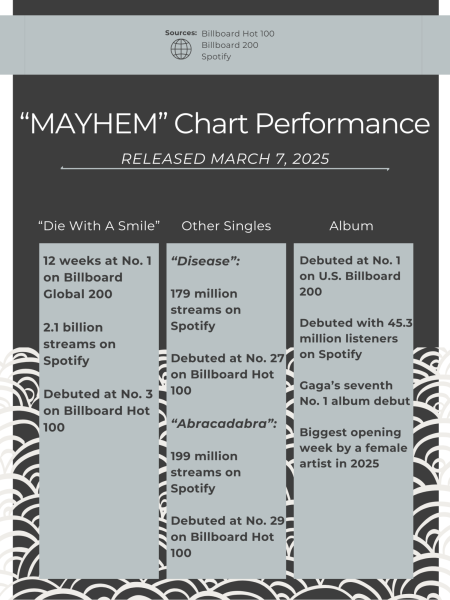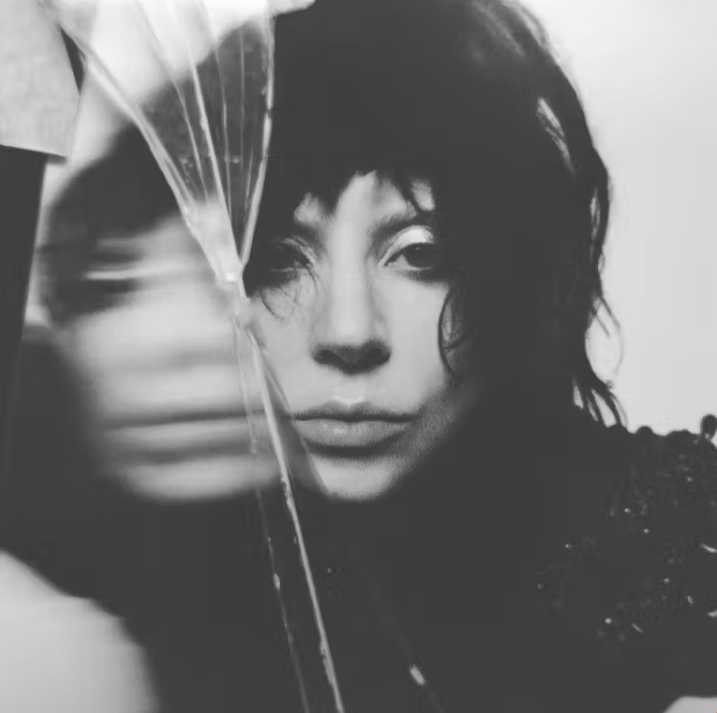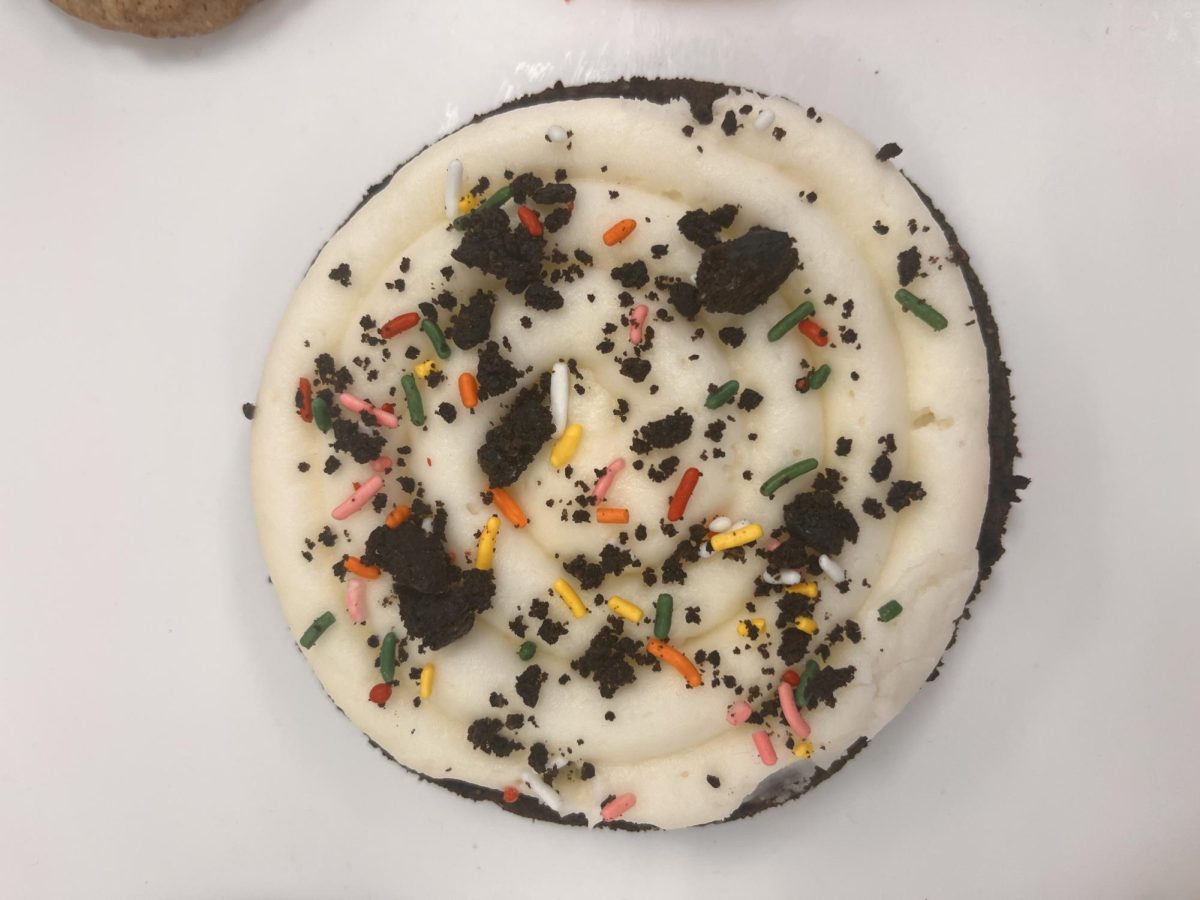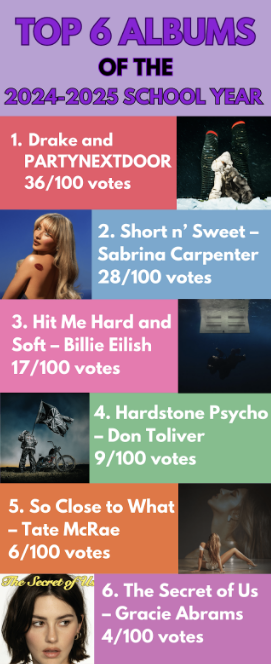After being caught in a “Bad Romance” with “Joker: Folie à Deux,” pop star Lady Gaga makes a dramatic return to music after five years with “MAYHEM,” channeling the core elements of her music style that have captivated the world for more than a decade.
Gaga’s sixth studio album was released on March 7, debuting at No. 1 on the Billboard 200 albums chart. The album, 14 songs, lasts 53 minutes and 11 seconds. “Can’t Stop The High,” the 15th track, is only available on select editions of physical releases of “MAYHEM.”
The opening track, “Disease,” explores the analogy that Gaga can rid her partner of anxieties and troubles through her love, performing the role of an antidote. This song, the second single of the album, effectively underlines the faintly grotesque tone of the album and emphasizes the metaphor often used by Gaga between illness, drugs and unconditional love, as seen in 2011’s “Born This Way” and 2013’s “ARTPOP.” This song serves as an immersive, electric introduction to the album that instantly evokes excitement to hear the rest.
Next, in “Abracadabra,” Gaga leans into an innovative mix of Latin and unintelligible sounds–an iconic move of hers wielded in hits like “Bad Romance” and “Judas” in order to create an intoxicating melody with a profound meaning. Mentioning a “poem said by a lady in red,” a portrayal of the self-conscious inner voices that make her question her self-worth is introduced. Gaga’s references to sorcery in this song demonstrate that extreme criticism has tricked her into believing damaging things about herself. “Abracadabra” details the other core theme of the album, which is the journey to accepting one’s true self, balanced with a catchy tune that has definitely stayed on repeat in my head.
After a strong start, Gaga breaks her lyrical pace with “Garden of Eden.” Although it employs a compelling topic inspired by the biblical paradise and is undeniably catchy, these components ultimately result in shallow lyrics and an unappealing inflection of some words. Additionally, track eight, “Zombieboy,” despite being a tribute to a late friend of Gaga’s, Canadian visual artist Rick “Zombie Boy” Genest, is also an unmemorable party song. At its best, it extends a motif of the album by relating people to monsters and infection, such as a “zombie bite,” but it mainly contains lackluster beats with little soulful connection to its listener. Overall, both of these tracks are forgettable.
My personal favorite song, “Perfect Celebrity,” arrives early on as the fourth track. What makes this song stand out is the volatile relationship between the pressure of the music industry and how artists present a romanticized version of themselves to the public that is often heavily criticized. While this subject may be often considered a sensitive one, I love that Gaga analyzes it with intensity and refreshing accuracy, complemented by her impeccable vocals and production style. In particular, the vocal crescendo in the pre-chorus immediately hooked me in.
“How Bad Do U Want Me” continues the theme of accepting one’s real, unapologetic self through rejecting the idealized version that her partners expect of her. This song maintains the synth production of the instrumentals and vocals from the rest of the album. However, Gaga embraces a pop style of diction, lyrics and melody reminiscent of Taylor Swift’s “1989” and Britney Spears’ “Oops!… I Did It Again.” Gaga certainly makes it clear why this genre of music is so successful through her meaningful lyrics and vibrant melody.
Tracks six and 12, “Vanish Into You” and “Shadow Of A Man,” explore contrasting perspectives on love and fame. The former song expresses Gaga’s desire to be sheltered by her partner from the stress of fame, while in the latter song, she spurns the idea of being eclipsed by the male artists who came before her, referencing icons such as Prince, David Bowie and Michael Jackson. Both tracks borrow melodies from some of Gaga’s best hits, like “Telephone” and “Bad Romance.” Her vocals also shine in each song, with beautiful harmonies in the verses of “Vanish Into You” and in the pre-chorus of “Shadow Of A Man.”

“The Beast” implements a haunting chord progression, increasingly building tension as Gaga describes her symbolic transition into a werewolf; her stage persona. Repeated lyrics like “you can’t hide who you are” illustrate the inevitability of her transformation and her acceptance of the parts of herself that others may consider unattractive. She balances the intensification of this pressure with a steady, measured tempo and an electrifying guitar solo, portraying her self-indulgent, sensual personality. This song has to be my second favorite of the album for its commanding instrumentals.
The seventh track, “Killah (feat. Gesaffelstein),” exudes unadulterated confidence and power as Gaga flaunts her romantic prowess, adhering to one theme of the album by energetically displaying self-confidence and another by alluding to the horror film “Silence of the Lambs” in reference to her physical relationship with her lover. While the song attempts to venture into a unique, groovy production style in collaboration with French DJ Gesaffelstein, I was left underwhelmed by the disengaged nature of the repetitive guitar riffs and vocal echoes in the chorus.
From this point, Gaga transitions into more melancholy ballads that bring her more recent music to mind, such as 2020’s “Chromatica” or 2018’s “A Star Is Born” with actor Bradley Cooper. While their music remains rhythmic and lively, songs “LoveDrug” and “Don’t Call Tonight” concern the emotionally painful outcomes of fleeting relationships.
Soft piano and acoustic guitar accompany Gaga’s dulcet tone in the penultimate track “Blade of Grass,” detailing her vows for her fiancé. Her request to “wrap that blade of grass around [her] finger like a cast” symbolizes the ring she asks her partner to propose to her with and the emotionally healing properties of his love. None of these tracks particularly break out among the power ballads that define this album, but I still found them meaningful and worthwhile.
The lead single and closing track, “Die With A Smile,” is a spectacular collaboration with Bruno Mars that definitely deserved the Grammy for Best Pop Duo/Group Performance. The two artists’ voices blend beautifully, partnered with warm, mellow instrumentation, composing a heartfelt ballad as the pair express pure devotion and adoration to their partners.
Altogether, Gaga returns to her roots of mainstream pop, preserving the same melodies and rhythms that have enraptured a global audience since 2008. “MAYHEM” undoubtedly cements Gaga’s position as one of the greatest pop stars of all time. I highly recommend this album to pop music lovers and those yet unconvinced of Gaga’s remarkable influence on the music industry.










